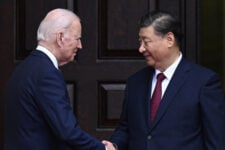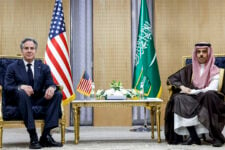President Joe Biden holds a semiconductor during his remarks before signing an Executive Order on the economy in the State Dining Room of the White House on February 24, 2021 in Washington, DC. (Photo by Doug Mills/Pool/Getty Images)
The last two American presidents may not share much political common ground, but their answer to America’s reliance on an increasingly delicate global supply chain has been the same: Move manufacturing to the US and “Buy American.” But below John Ferrari of the American Enterprise Institute argues how that policy isn’t best for America, much less the rest of the world.
With their determination to “onshore” production of the supply chain, Biden officials are following the same path as former President Donald Trump. To the credit of both administrations, from an economic and national security point of view, they are entirely correct in identifying the problem — namely that critical American supply chains are vulnerable to sabotage by its rivals.
But both presidents got the solution wrong. The answer isn’t to “Buy American,” it’s to “Attract Allies” by supporting production in partner nations and buy from them. Don’t hide from the global national security economy, diversify it.
Currently China, through its grip on especially the electronics industry and its menacing of Taiwan, has the ability to sabotage and potentially destroy our economy, weapon systems, and critical information technology infrastructure. This gives Chinese President Xi Jinping an enormous advantage over the United States, similar to the way Russian President Vladimir Putin is subverting the Europeans over energy.
While COVID has underscored the fragility of America’s supply chains, it is nowhere near what could happen during heightened tensions or hostilities with China. Imagine a scenario of no chips from Taiwan and no ships crossing the Pacific. Given this threat, we need to reduce our dependency on China specifically and the Pacific Rim more generally.
But the instinct to simply make everything stateside, borne out in Trump’s and Biden’s “Buy American” plans, is extremely flawed despite polling well and being electorally popular.
To find a different answer, we need to recognize several facts: Our military today is a small player in the commercial marketplace, both domestically and globally. The Defense Department is simply not going to be able to dictate a solution by itself.
Second, the direct military and economic support of our allies, while we fight off Chinese coercion, or even war, is critical. Therefore, we need to “pool” our defense buying power when procuring common parts, information technology, and weapon systems. This is not just for interoperability, but also for efficiency in scale.
Additionally, we cannot and should not create protectionist barriers to keep China away if those barriers also erect a wall between us and our allies or potential allies. The worst thing we can do is send a signal that it’s “every country for itself.”
The solution? The Biden administration should change its goals and messaging from “Buy American” to “Attract Allies” even if it could be politically toxic. A new Cold War is upon us, and we need to admit that COVID has demonstrated that we are already vulnerable to being held hostage.
Take the semi-conductor market for example. Right now, all roads lead to China and Taiwan. The current plan is to subsidize the production of new plants in the US. What we actually need is to diversify the production of these critical chips away from the first island chain in East Asia, and anchor production in the US, Europe, Australia, and India.
The US military, along with allied military forces could then set standards for hardening and securing the chips themselves, for improving cyber security, while also diversifying production facilities so that we do not present China with a single targeting challenge. Subsidies from western militaries could pay for the cyber security hardening of the chips, while national governments could subsidize the production of several plants across the globe, similar to the current plan in the US to allocate $50 billion for chip production facilities.
With every nation piling on debt to pay for the COVID pandemic, our military allies, not to mention our own forces, are already constrained by a lack of resources. We need to set up purchasing cooperatives with our allies to achieve economies of scale in production, and through interdependencies with friendly nations, gain efficiency, effectiveness, and security.
A recent conference of the Association of the United States Army had many small defense firms from other countries sharing the convention floor with global defense giants. It was a good reminder that the giants could afford the cost of selling their products to dozens of national bureaucracies, while smaller firms could not.
Imagine the benefits of having only one global military purchasing standard and contracting process with no special “Follow This ‘Insert Country Name’ Rules.” By contrast, today, in America, the administration’s provisions in “Buy American” would force these smaller international firms to either move production or partner with local firms, both of which are extremely inefficient.
Interoperability between allied forces during war is also crucial. An everyone “roll their own” approach to procurement is a detriment on the battlefield from a resupply perspective, and even more critical when it comes to data sharing among weapon systems. During the Cold War, NATO enforced its standards for resupply and munitions. Today that process is gone in Europe and lacking in the Pacific. “Buy American” will only make this problem worse.
Protectionism is fraught with the danger of reciprocity, and it is likely that no nation will want to make the first move. President Biden’s agreement with like-minded nations over global corporate taxes offers hope that global cooperation is possible.
Therefore, the administration should move quickly now to establish a defense and economic security alliance, drop the “Buy American” rhetoric, and promote an “Attract Allies” security policy.
Maj. Gen. John Ferrari, US Army (ret.), a nonresident senior fellow at the American Enterprise Institute (AEI), is a former director of program analysis and evaluation for the US Army.
TAI exec claims 20 Turkish KAAN fighters to be delivered in 2028
Temel Kotil, TAI’s general manager, claimed that the domestically-produced Turkish jet will outperform the F-35 Joint Strike Fighter.


























